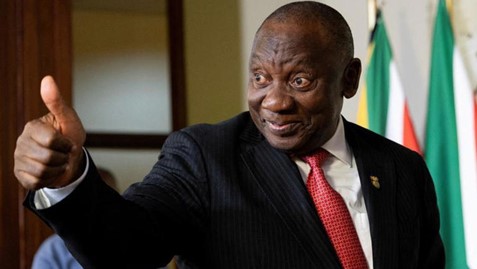The National Prosecuting Authority (NPA) has stated to the public that they will not pursue corruption and related charges against President Cyril Ramaphosa in relation to the controversial farm theft scandal that almost ended his presidency two years ago. The decision by South Africa’s chief prosecuting officials will prove to be controversial among those who expected the President to be prosecuted.
A former spy chief laid a criminal complaint against Ramaphosa, accusing him of committing irregularities in trying to hide the theft of $4m (£3.25m) in cash at his game farm in the north-eastern Limpopo province. The president denied any wrongdoing, saying that the money stolen from his sofa in 2020 came from the legitimate sale of buffaloes at his Phala Phala farm. The decision not to bring any charges against Ramaphosa or anyone else came after “a comprehensive investigation process”, prosecutors said. Ramaphosa survived the so-called “farmgate” scandal and was re-elected as president in June, albeit after being forced to form a coalition, while the criminal investigations were still ongoing.
Ramaphosa has dodged a bullet. Even though he should have come clean about how he obtained the money and used his personal state security to track down the thieves who stole it he is still innocent until proven guilty. Ramaphosa is still less shady than other members in his government. The National Prosecuting Authority (NPA) has done all it can to navigate the sensitive complications of this investigation and have gone to the bottom of this case. The theft of $ 4million from the President’s Phala Phala farm is an interesting case. How could burglars much less thieves know the value of money in a foreign currency especially out in the rural areas? Also, the inside covers of your Sofas is an odd place to be keeping raw cash. Would a safe not be more suitable or even a monetary down payment to a bank account?
Ramaphosa could have avoided this legal crisis by simply going through proper financial channels.
The NPA said its decision not to prosecute follows a comprehensive investigation process conducted by the Directorate for Priority Crimes Investigation (also known as the Hawks) following (Arthur) Fraser’s complaint. The investigations also covered any possible contravention of the Income Tax Act 58 of 1962 and Exchange Control Regulation 1962. This was subsequent to the break-in and theft of an undisclosed amount of US dollars at Phala Phala Farm, Bela Bela, Limpopo. The prosecuting authority said the DPP made the decision not to prosecute after carefully assessing all available evidence presented to the prosecutors by the DPCI. Thenga concluded that there is no reasonable prospect of a successful prosecution based on evidence in the docket.
The NPA has done a thorough investigation in line with the Hawks. This should lay to rest the allegations of fraud and corruption on the game farm owned by President Ramaphosa and First Lady Tshepo Motsepe. The investigation has shown that President Ramaphosa is still transparent about his business dealings. The laws that were the basis of the investigation have not been broken. Former State Security Agency Director General Arthur Fraser may have just been spiteful and was spreading rumours. He should be cross-examined about his allegations and face charges of his own. Ramaphosa has battled long and hard against the accusations levelled against him. It could have brought down his presidency and destroyed his legacy. Fraser was a supporter of former president Jacob Zuma and should be questioned about his motives.
“The DPP made her decision in line with the Prosecution Policy of the NPA, which states that a prosecutor, in deciding whether to institute criminal proceedings against an accused person, must assess whether there is sufficient and admissible evidence to provide a reasonable prospect of a successful prosecution,” the statement read. It added that various factors must be considered when the prosecutor evaluates evidence, notably:
- The strength of the case for the State.
- The availability of evidence.
- Whether the State witnesses are likely to be credible.
- The admissibility of evidence.
- The reliability of evidence.
- The strength of the case for the defence.
The Director of Public Prosecutions (DPP) Shamila Batohi looked at the evidence presented to her and accessed the case against the President. This was no easy task. The realization of the fact that Fraser had a grudge against Ramaphosa would have weighed heavily. If Ramaphosa was indeed guilty of the accusations and allegations levelled against him by Fraser then what evidence was given to prove Ramaphosa’s guilt. As Director of State Security Fraser would have kept records of the incident. Did he disclose them as evidence to the NPA?
Batohi clearly did not find any thing suspicious in the President’s security personal’s conduct then Fraser is grasping at straws. If the investigation of a case of tax easion by the president was proven to be false and he did not abuse his authority and privileges in any way then Fraser will be discredited as a reliable source. Ramaphosa for his part can rise above this slander and use the moment to learn how to better lead the country. It all depends on how the President responds to his critics.
Article written by:
Yacoob Cassim
Journalist at Radio Al Ansaar






